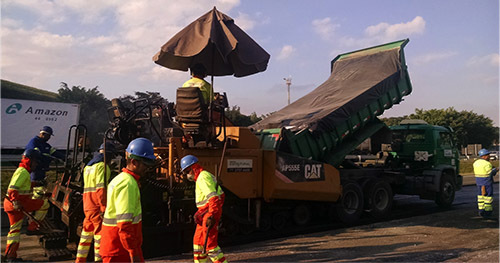The recycling race
Sep 12, 2016
 For years, agencies in the U.S. have been leading the way when it comes to combining sustainable road building practices with a warm mix technology like Evotherm®. Take recycled asphalt pavement (RAP), for example. Many U.S. agencies have shared numerous success stories about how the performance of their mix has been improved by adding Evotherm. These sustainable recycling practices are now gaining hold in other parts of the world, such as Brazil.
For years, agencies in the U.S. have been leading the way when it comes to combining sustainable road building practices with a warm mix technology like Evotherm®. Take recycled asphalt pavement (RAP), for example. Many U.S. agencies have shared numerous success stories about how the performance of their mix has been improved by adding Evotherm. These sustainable recycling practices are now gaining hold in other parts of the world, such as Brazil.
Hernando Faria, business unit manager for Ingevity in Brazil, explains that “road agencies in Brazil are most interested in using RAP and Evotherm because they have large amounts of milled pavement material that needs to be utilized. Then, as large agencies get involved in these types of sustainable initiatives, other stakeholders in the paving chain become interested as well.” Faria also confirms that the adoption of sustainable practices is accelerating at this time for many reasons: success stories from the U.S. and Europe have made their way to South America; there are increasingly strict environmental laws in Brazil; and RAP is an effective option to enable road agencies and contractors in Brazil to optimize costs.
When asked about the market acceptance of RAP for WMA in Brazil, Hernando states that “the Brazilian market is in its infancy. Common practice in Brazil is the utilization of milled material for base courses where this material is normally used with cement, which creates a semi-rigid base layer. The problem with this kind of application is that the material is used only as aggregate. While you save virgin aggregate, you lose binder material and decrease overall pavement performance.”
The first project incorporating Evotherm and RAP in Brazil was in August of 2016. Two different types of virgin, unmodified asphalt binder and PMA were used with 10% and 25% of RAP. Hernando reports that the project was done with Rota das Bandeiras on Sao Paulo State Road 65. “This is an important road that connects the southeastern cities of Campinas and Jacarei,” says Hernando. “The WMA and RAP were used as mix for the binder course and wearing course in a full-depth reconstruction project.”
Mixing, laydown, and compaction at the job site went smoothly. The recycled asphalt mixture proved to be very homogeneous and well bonded. The temperature at the mix plant was 140°C (284°F) and the laydown was 110°C (230°F). All density results were within the mix design specification. As an added bonus, the number of roller passes was reduced by 50%, speeding up construction while still achieving compaction.
Stay tuned for future updates about how and where else sustainable recycling practices continue to take hold across the globe.
